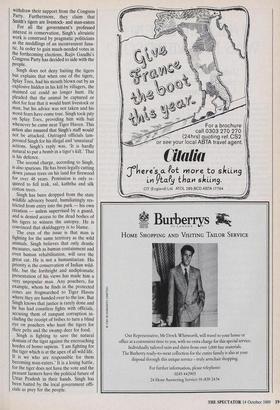TIGER MAN AT BAY
Jane Mulvagh investigates
the campaign to oust the father of Indian wild life conservation
WHY is Billy Arjan Singh, the 'Tiger Man' of Dudwa National Park, being prosecuted in the Lakhimpur Kheri courts of the Uttar Pradesh province of India for the alleged violation of the very principles to which he has dedicated his life — saving the tiger and its natural habitat?
Singh's 40-year crusade to protect the national animal of India from extinction has won him the World Wildlife Gold Medal, the Indian Padma Shri and the Knighthood of the Golden Ark from Prince Bernard of the Netherlands, as well as the respect and friendship of leading conservationists such as Sir Peter Scott, Konrad Lorenz and the recently murdered George Adamson. He has lived as close to the primitiveness of nature as is humanly possible in order to rehabilitate tigers and leopards and single-handedly to save the rare swamp deer, the tiger's favoured prey.
Now 70 years old, Singh is accused of illegally baiting and of stealing dry wood from the national park. Baiting — tether- ing live prey — is a ploy used to attract the tiger into a chosen area. This outlawed practice is often resorted to, even by members of the forest department, in order to prove to visiting VIPs that the animal is flourishing. The cases were filed in February this year but there has not been a single court hearing. In the interim Singh has suffered public ridicule and harassment. The long-drawn-out legal bat- ties, the outcome of which will be highly suspect, will undoubtedly bankrupt him. He has been fighting his lonely battle for many years but this recent episode has driven him to desperation. 'I've given everything I have to my work and I can't understand how they treat me so.'
The forest officials, supposedly responsi- ble for protecting the 200 square miles of the Dudwa National Park, a park that Singh established with the help of Indira Gandhi in the early Seventies, are claimed to have systematically vandalised Singh's machans (viewing platforms in the trees) both on his own estate, Tiger Haven, and in the adjoining park. It is suspected that they have stolen his camera equipment, destroyed the bridge between his home and the park and turned a blind eye to illegal poaching and timber-cutting by the local people. The two leopards donated to him by Indira Gandhi that he so painsta- kingly rehabilitated have both been poisoned. Why?
The local population, consisting of a number of Kisan peasant farmers resettled after Partition, in collusion with the forest officials, want to see Billy Singh fall. In 1986 he won a stay from the High Court, in accordance with the Conservation Act, prohibiting entry into the park to collect firewood and fodder. The villagers were incensed, claiming that their natural rights were being withdrawn, and vowed that if the stay was not removed they would withdraw their support from the Congress Party, Furthermore, they claim that Smith's tigers are livestock- and man-eaters For all the government's professed interest in conservation, Singh's altruistic work is construed by pragmatic politicians as the meddlings of an inconvenient fana- tic. In order to gain much-needed votes in the forthcoming elections, Rajiv Gandhi's Congress Party has decided to side with the people.
Singh does not deny baiting the tigers but explains that when one of the tigers, Splay Toes, had his mouth blown out by an explosive hidden in his kill by villagers, the maimed cat could no longer hunt. He pleaded that the animal be captured or shot for fear that it would hunt livestock or man, but his advice was not taken and his worst fears have come true. Singh took pity on Splay Toes, providing him with bait whenever he came near Tiger Haven. This action also ensured that Singh's staff would not be attacked. Outraged officials lam- pooned Singh for his illegal and 'unnatural' actions. Singh's reply was, 'It is hardly natural to put a bomb in a tiger's kill.' That is his defence.
The second charge, according to Singh, is also spurious. He has been legally cutting down jamun trees on his land for firewood for over 48 years. Pemission is only re- quired to fell teak, sal, kaththa and silk cotton trees.
Singh has been dropped from the state wildlife advisory board, humiliatingly res- tricted from entry into the park — his own creation — unless supervised by a guard, and is denied access to the dead bodies of his tigers to witness the autopsy. He is convinced that skulduggery is to blame.
The crux of the issue is that man is fighting for the same territory as the wild animals. Singh believes that only drastic measures, such as human containment and even human rehabilitation, will save the great cat. He is not a humanitarian. His priority is the conservation of Indian wild- life, but the forthright and undiplomatic presentation of his views has made him a very unpopular man. Any poachers, for example, whom he finds in the protected zones are frogmarched to Tiger Haven where they are handed over to the law. But Singh knows that justice is rarely done and he has had countless fights with officials, accusing them of rampant corruption in- cluding the receipt of bribes to turn a blind eye on poachers who hunt the tigers for their pelts and the swamp deer for food.
Singh is fighting to save the natural domain of the tiger against the encroaching hordes of homo sapiens. 'I am fighting for the tiger which is at the apex of all wild life. It is we who are responsible for them becoming man-eaters,' It is a losing battle, for the tiger does not have the vote and the peasant farmers have the political future of Uttar Pradesh in their hands. Singh has been baited by the local government offi- cials as prey for the people.



























































 Previous page
Previous page